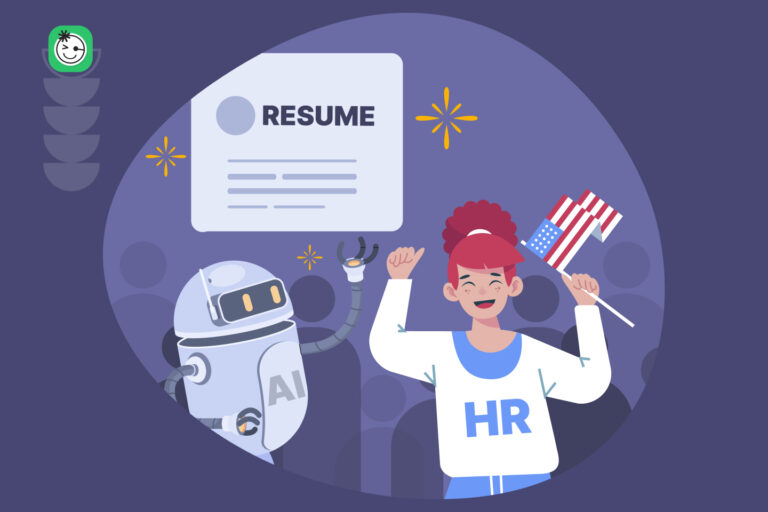How to Decline a Job Offer: Tips for Turning Down an Offer Without Harming Your Career
The job search can feel like a marathon. From crafting the perfect resume to acing interviews, it’s no surprise that receiving a job offer can feel like the finish line. But what happens when that offer isn’t the right fit? Whether it’s the company culture, salary expectations, or a better opportunity elsewhere, declining a job…
The job search can feel like a marathon. From crafting the perfect resume to acing interviews, it’s no surprise that receiving a job offer can feel like the finish line. But what happens when that offer isn’t the right fit? Whether it’s the company culture, salary expectations, or a better opportunity elsewhere, declining a job offer can be a delicate process.
In an age where AI job search platforms are revolutionizing how we find and apply for jobs, it might seem counterintuitive to turn down an offer after an AI-powered system has worked so hard to match you with a potential employer. However, as much as AI job search tools have made our job searches more efficient, the human element of decision-making is still critical when it comes to choosing the right fit for your career. Sometimes, saying “no” is the most strategic move you can make for your future.
In this article, we’ll walk you through how to respectfully decline a job offer, offering tips and strategies to help you maintain professionalism and keep the door open for future opportunities — all while keeping your career trajectory on track.
Why Declining a Job Offer Is Sometimes the Right Decision
When you’ve put in the time and effort to search for a job, attend interviews, and go through multiple rounds of evaluations, receiving an offer can feel like the culmination of your hard work. But what happens when that offer doesn’t quite fit what you’re looking for? Declining a job offer is not always an easy decision, but sometimes it’s the right one.
There are many reasons why a job offer might not be the right fit for you, and it’s important to recognize that it’s okay to turn it down. Here are a few specific scenarios where declining might be the best move:
- Cultural Mismatch: One of the most important aspects of any job is how well you fit into the company culture. Maybe during the interview process, you picked up on subtle clues that the company’s values or work environment didn’t align with your own. For example, you might be someone who values work-life balance, but during the interview, you learn that the company expects employees to work long hours consistently. In this case, declining the offer can save you from a stressful, unsatisfying work experience.
- Unsatisfactory Compensation: While salary isn’t everything, it is an important factor in deciding whether to accept a job offer. If the compensation package doesn’t meet your financial needs or align with industry standards, it’s perfectly reasonable to decline. For instance, if you’ve been offered a role in a major city with a higher cost of living, but the salary doesn’t reflect that, you might find yourself struggling to make ends meet. Turning down an offer due to salary concerns is not only acceptable but also a smart financial decision for your future.
- Lack of Growth or Advancement Opportunities: A job that doesn’t offer room for professional development or career advancement can quickly feel stagnant. If the job offer doesn’t align with your long-term career goals or doesn’t offer the kind of growth opportunities you’re looking for, declining it can be a smart decision. For instance, if you’ve been working in entry-level positions for a few years and the offer you received doesn’t provide a clear path to promotion or skill enhancement, it might make sense to pass on that opportunity and continue your search for a job that helps you move toward your career aspirations.
- Location and Commute Issues: The location of a job plays a significant role in your day-to-day quality of life. If the job is located too far from your home, causing an unbearable commute, or if you would have to relocate to an area you’re not excited about, it’s okay to decline the offer. For example, accepting a job in a city with a high cost of living or a location that doesn’t support your lifestyle preferences might leave you feeling unfulfilled, even with a competitive salary.
- Alternative Job Opportunities: Sometimes, you might have multiple offers on the table, and another opportunity aligns better with your goals or interests. If you’ve been using AI job search tools, you might have come across a position that fits your skills and career trajectory even better than the current offer. With AI-powered platforms helping you apply to jobs tailored to your interests and career goals, you may find that another opportunity is a better match. In this case, it’s perfectly acceptable to decline an offer in favor of the one that better aligns with your aspirations.
While it may feel uncomfortable to decline a job offer, it’s important to remember that it’s a normal part of the job search process. The goal is to find a role that excites you, supports your career growth, and aligns with your values. Declining an offer allows you to make a decision that’s in your best interest, both professionally and personally. The last thing you want is to accept an offer out of pressure, only to regret it later.
Fortunately, AI job search tools can make this decision easier by helping you pinpoint roles that truly fit your needs. These platforms analyze your preferences and qualifications, allowing you to apply for jobs that are a better match from the start. By using AI for job search, you increase your chances of receiving offers that you are excited about, which means you may find yourself turning down fewer offers because they will be better aligned with what you’re looking for.
In the end, it’s all about finding the right fit. And remember, saying “no” today can open up a better opportunity tomorrow.
Step-by-Step Guide to Declining a Job Offer Respectfully
Declining a job offer doesn’t have to be a daunting task. By following a few key steps, you can ensure that you communicate your decision clearly, professionally, and respectfully, leaving a positive impression with the employer. Here’s a simple, step-by-step guide to help you navigate the process:
1. Express Gratitude First
Start by thanking the employer for the offer and expressing your appreciation for the time they invested in getting to know you. Whether through interviews or assessments, acknowledge their efforts to consider you for the role. This shows that you value their interest in you, even if you’re ultimately deciding to decline the offer.
Example:
“Thank you so much for offering me the opportunity to join [Company Name]. I truly appreciate the time and effort you and your team have taken to evaluate my qualifications and meet with me over the past few weeks.”
2. Be Clear and Direct
While you want to be polite and respectful, it’s important to be clear and direct about your decision. Avoid ambiguity. Let them know as soon as possible that you’re not accepting the offer. Being prompt in your response is crucial, as employers often have timelines they need to stick to in order to continue with their hiring process.
Example:
“After careful consideration, I have decided to decline the job offer. While I have enjoyed learning more about [Company Name] and the team, I believe that this opportunity is not the right fit for my career goals at this time.”
3. Provide a Brief, Honest Reason (If Comfortable)
You don’t have to go into great detail, but providing a brief, respectful reason for your decision can help the employer understand your position. Whether it’s a better salary elsewhere, a role that better aligns with your skills, or personal circumstances, a short explanation can help maintain goodwill.
Example:
“Ultimately, I have decided to accept a different position that aligns more closely with my long-term career objectives.”
If you’d prefer not to share specifics, it’s perfectly fine to keep your reason general but still appreciative. It’s important to remain respectful, as you never know when your paths might cross again in the future.
4. Leave the Door Open for Future Opportunities
One of the most important aspects of declining a job offer is to leave on good terms. Let the employer know you are open to future opportunities, even if this particular role isn’t the right fit. This helps preserve the professional relationship and shows that you respect the company.
Example:
“I would welcome the opportunity to stay in touch, and I hope we can cross paths again in the future. Thank you once again for your offer, and I wish [Company Name] continued success.”
5. Write a Polite and Professional Email
Most job offer declines are handled via email, which gives you the space to carefully craft your response. Be professional, polite, and concise. Avoid any emotional language or negative comments about the company or the role.
Here’s an example email template you can use when declining a job offer:
Subject: Job Offer – [Your Name]
Email Body:
“Dear [Hiring Manager’s Name],
Thank you so much for offering me the [Job Title] position at [Company Name]. I greatly appreciate the time and effort you and your team have taken throughout the interview process.
After careful consideration, I have decided to decline the offer as I have chosen to pursue another opportunity that is more in line with my long-term career goals.
I hope we can stay in touch, and I wish [Company Name] all the best in the future. Thank you again for the opportunity.
Sincerely,
[Your Name]”
So, while declining a job offer isn’t always easy, it’s all about making the right decision for you — and maintaining professionalism at every step. Whether you’re turning down an offer due to a better opportunity or simply realizing that the job doesn’t match your needs, handling the situation gracefully ensures you continue to move forward in your career with confidence.
The Power of Maintaining Professional Relationships After Declining an Offer
When you decline a job offer, it’s important to remember that your decision doesn’t have to sever ties with the company. In fact, how you manage the situation can play a significant role in shaping your professional reputation and potentially opening doors for future opportunities.
Maintaining positive relationships with companies, even after turning down an offer, is crucial for a few key reasons. First, the job market is dynamic, and opportunities often arise when least expected. A role you may not have been interested in today might be a perfect fit down the line as your career evolves or as the company’s needs shift. By staying on good terms with the company, you position yourself to be considered for future openings that align more closely with your goals.
Furthermore, employers value candidates who handle the rejection process professionally. Turning down an offer gracefully demonstrates maturity, respect, and a clear understanding of your career priorities. Companies recognize candidates who are thoughtful about their decisions and can communicate them respectfully. This kind of professionalism leaves a positive impression, which could lead to being contacted about future opportunities or even receiving a referral to another company.
Networking is another important aspect of maintaining these relationships. Even if you’re not interested in a position today, recruiters and hiring managers can be valuable connections in the long term. Building a network within the industry can increase your chances of learning about new job openings early, allowing you to make better-informed decisions. Regularly staying in touch — whether through LinkedIn, professional events, or occasional emails — helps keep you on their radar and fosters a sense of familiarity and trust.
Lastly, professional relationships are not just about immediate opportunities. A good network can help you access industry insights, advice, and potential collaborations. By maintaining strong, respectful ties with companies, you create a network of professionals who can offer support and guidance as you continue to grow in your career.
In summary, declining a job offer doesn’t need to be the final step in your relationship with that company. Handling the situation with professionalism and respect helps ensure that you remain a valuable contact, both for future opportunities within that organization and for networking within your industry. Keeping these lines of communication open is not only beneficial in the short term but also crucial for long-term career success.

How AI Job Search Tools Can Help You Make Better Career Decisions
Making the decision to decline a job offer often stems from the realization that the position isn’t the best fit for your career goals or personal circumstances. But how can you reduce the likelihood of needing to decline offers in the first place? One powerful way is by utilizing AI job search tools like JobHire.AI.
AI-powered platforms can significantly improve your job search experience by helping you focus on opportunities that are most likely to align with your skills, preferences, and career aspirations. These platforms use machine learning algorithms to match you with roles that suit your qualifications and fit your goals, taking the guesswork out of applying for jobs. Here’s how AI tools can play a pivotal role in your decision-making process:
1. Personalized Job Matches
JobHire.AI analyzes not only your resume but also your preferences, such as salary expectations, work environment, and career advancement goals. This allows it to suggest jobs that are tailored to your specific needs, which increases the likelihood of finding positions that you’re genuinely excited about. By filtering out roles that don’t align with your values AI helps you avoid wasting time on job applications that won’t ultimately be a good fit.
2. Saving Time and Reducing Stress
Job searching can be overwhelming, especially when you’re trying to keep track of multiple applications and deadlines. With JobHire.AI, you can automate repetitive tasks, such as applying to multiple jobs or generating personalized cover letters and resumes. This allows you to focus more on making thoughtful decisions about the offers you do receive, rather than feeling rushed or pressured to accept the first offer that comes your way. This efficiency gives you more time to consider whether an offer truly aligns with your career path.
3. More Informed Decisions
AI tools don’t just match you with the right roles — they also provide insights about companies, salary trends, and potential career paths. This data can help you make more informed decisions when weighing job offers. Some AI tools can provide information on company culture, employee reviews, and salary benchmarks, which can be essential when deciding whether to accept or decline an offer.
4. Enhanced Application Process
By using AI job application systems like JobHire.AI, you can apply to jobs that are a better match for your skills, thus reducing the chances of needing to decline offers due to misalignment. JobHire.AI helps you refine your resume and cover letter, ensuring they are tailored to each position and highlight your most relevant experiences. This level of customization increases the likelihood that you’ll land roles that are genuinely a good fit, minimizing the chances of rejecting offers.
5. Building Your Ideal Career Path
These tools are designed not only to help you land your next job but to support your long-term career growth. By continuously refining your job preferences and adjusting your profile as your career goals evolve, JobHire.AI helps you stay on track for achieving your professional aspirations. Instead of settling for a job that doesn’t meet your needs, you can use JobHire.AI to find positions that push you toward your ultimate career goals, whether that’s a higher salary, more flexibility, or better growth opportunities.
In short, JobHire.AI and other AI job search tools don’t just help you find jobs — they help you make better, more informed career decisions. By taking advantage of these tools, you can increase the likelihood of landing a job that truly fits your needs, reducing the chances of needing to decline offers and streamlining your entire job search process.
Conclusion
Declining a job offer may not always be easy, but it’s a decision that can significantly impact your long-term career satisfaction and growth. By approaching the situation with professionalism, clarity, and respect, you ensure that you maintain strong relationships with potential employers and keep the door open for future opportunities. It’s important to remember that your career journey is unique, and sometimes saying “no” to one offer is simply a step toward finding a better fit.
Using tools like JobHire.AI makes the entire job search process more efficient, helping you focus on the roles that truly align with your goals. With AI job search technology, you can apply for jobs that match your preferences, saving you time and reducing the chances of needing to decline offers later. Whether it’s personalized job matches, automated application processes, or more informed decision-making, AI tools take the guesswork out of the job search, enabling you to make smarter career choices.So, the next time you find yourself in the position to decline an offer, remember: it’s not the end — it’s just another step toward finding the job that’s the perfect fit for you. Use the power of AI job search tools like JobHire.AI to make informed decisions, and don’t be afraid to turn down an offer that doesn’t align with your vision for the future. After all, your career path is yours to shape, and every decision you make brings you closer to the right opportunity.







